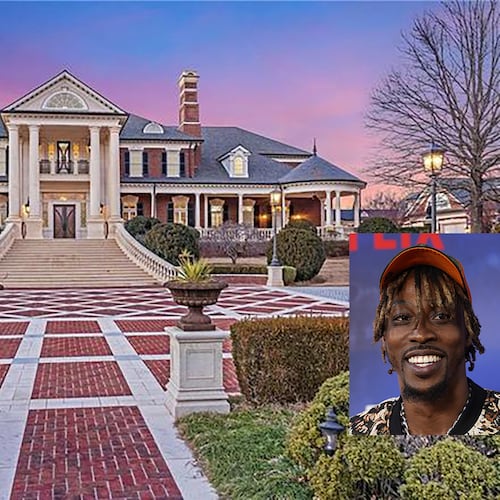Fans of the HBO television's “Treme” know that music is like another character on the show. So it makes sense that when creator David Simon was developing the premise, he consulted with New Orleans music icons such as saxophonist Donald Harrison, Jr., and even asked him to appear in a couple of episodes.
The jazz saxophonist’s Treme neighborhood upbringing can be heard in every note he plays on his 20-plus albums – including the recently released “This Is Jazz” -- and in his joyous live performances. The “King of Nouveau Swing,” Harrison draws from several different genres – and has even made a foray into rap – but always comes back to draw from his musical roots.
Still rebuilding his home after Hurricane Katrina, Harrison has seen New Orleans residents help each other heal in the wake of tragedy. That celebration of life is one of the themes he explores – along with several other artists including Kermit Ruffins, Rebirth Brass Band and Glen David Andrews – in a Night in Treme, a show celebrating the musical majesty of New Orleans on Saturday at the Rialto Center for the Arts. We talked with Harrison this week about the show:
Q: You’ve been on the Treme tour off and on for a few months. Any good stories??
A: I think the most interesting thing is to see the effect of New Orleans music on the audience. The Kennedy Center is not really a place where people get up and dance. There are a lot of politicians in there, and they have an image to maintain. On the first song, you could tell they wanted to move, but they were uncomfortable with this concept. But by the second song, they started getting up and by the third song, the audience got up and started dancing, and they danced through the first set and the second set of the concert. So we had the biggest party that the Kennedy Center, I think, has ever had. It was beautiful. To see senators dancing is a great thing to me. It was great to see the effect the music has on some of the most serious people in the world.
Q: You’re known for your work in several different genres. Is there one in particular you feel most comfortable in?
No. I consider myself a modern jazz musician, but I love all types of music. If the music feels good and it feels like I should be playing it, I just play it, I never second guess it. Because of that, I’ve been able to cross-pollinate all those styles into my style. I just love all types of music. I love to dance, I love to listen to funky bands, I love to listen to swinging bands, Latin, Afro, Caribbean music, Mexican music – everything. I grew up in a household with all types of music. I never thought of music in boxes. I think it’s helped me have a lot of respect for humanity. It helped me to realize that people are people and everyone has something beautiful they can do.
Q: You’ve tackled rapping in some of your recent work. How did that come about?
A: I was in Brooklyn, and there was this little kid, and his name was Christopher Wallace [later known as the rapper The Notorious B.I.G.], so he would come to my house everyday, and we got to be good friends. And I sort of taught him aspects about music which he used in his rap style. I was teaching him about jazz and music and he kept me abreast of rap, and through that process, I started saying, “I know I’m a little older, but I’ll rhyme with you.” I developed somewhat of an older person's vision of what hip hop and MCing could be. And it’s a lot of fun.
Q: What are things like in New Orleans now?
A: The strength of the people here who have had to endure so much is mind-boggling. Everyone that I’ve known has been through contractor fraud, with the contractor taking all of your money. But The most beautiful aspect is people coming from all around the country and the world to help in a one-on-one kind of way. That’s the most beautiful thing, when it’s personal like that. Nobody is making any money, it’s just out of love. It restores faith in human beings when you see that.
Q: How has the rebuilding process been for you personally?
I’m still rebuilding. I’m doing construction as we speak. I’ve become a sort of jack of all trades -- with carpentry, plumbing, electrical work. You have to learn how to do this stuff. I’m enjoying carpentry. Now I’m building custom cabinets. I’ve had offers to work for other people, but I just don’t have the time. There’s only so much time in the day.
You’re a Congo Nation Mardi Gras Indian chief. What do those duties entail?
You have to get the respect by knowing the culture – knowing the drumbeats, the rituals, the dancing. How to make the costumes and how to interact with other Mardi Gras Indian groups. There’s a lot of African influence in it, and I’d like to think I’m continuing the legacy of Congo Square by developing those rhythms that are African-inspired but were developed here in New Orleans.
Q: How many parades have you been in?
I’ve been doing it since I was 2. My father was a chief –- I come from an old line. I know what the old words mean, what the old drumbeats mean. I’m fortunate that I was around those guys. They used to talk about the old ways all the time. I thought they were just reminiscing, in my mind I was like, “I’ve heard these stories a million times from you guys, I don’t need to hear it anymore.” It took me all these years they were teaching me without teaching me. Now I'm doing the same thing, so I understand.
Event Preview
'A Night in Treme – The Music of New Orleans' starts at 8 p.m. Saturday at The Rialto Center for the Arts, 80 Forsyth St. NW, Atlanta. Tickets are $45 to $71 at 404-413-9849 or www.rialtocenter.org.
About the Author
The Latest
Featured


